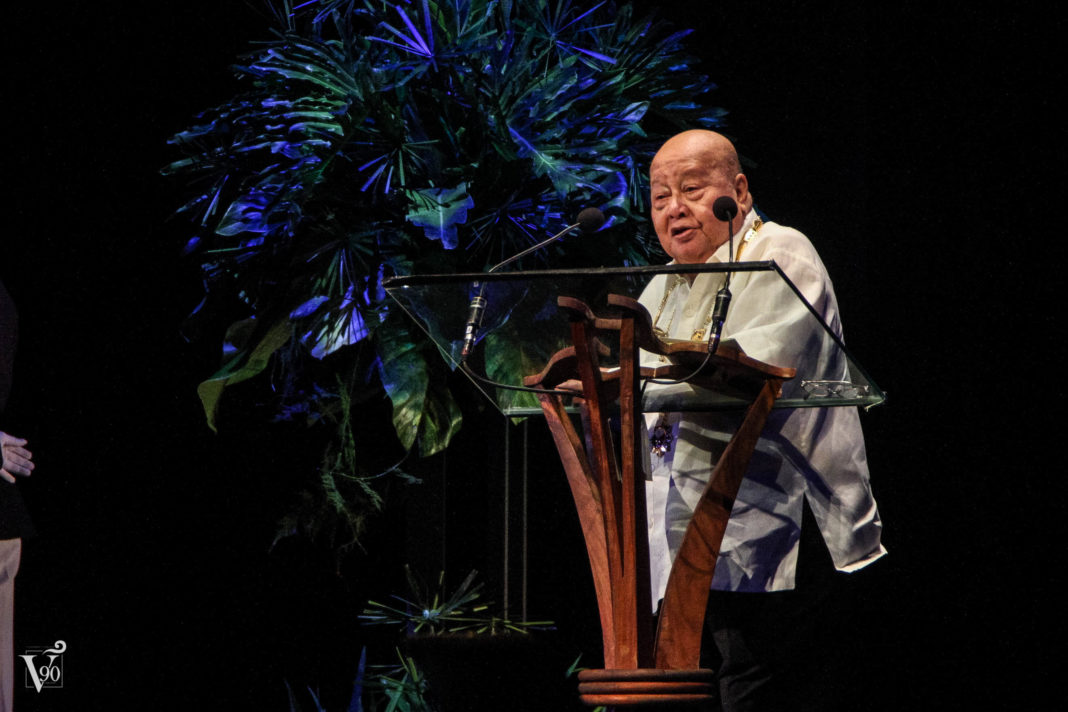IT IS the memory of Francisco Sionil José’s generosity as a friend that will remain with Lualhati Bautista.
“He always brought us younger writers to lunch and dinner, sent me Christmas gifts big and small … That is the kind of friend Frankie was,” the acclaimed novelist in Filipino said in an interview with the Varsitarian.
Bautista will also remember José for his surprising and humorous gestures such as when she was given a check worth P20,000 for Christmas.
“Sabi ko, bakit? He laughed and said, Wala because I am rich, that’s why!” she said.
National Artist for Literature Francisco Sionil José passed away on the evening of Jan. 6. He was 97.
Family members, friends and colleagues paid tribute to the life of “Frankie”, as José was fondly called, and his prolific and decades-spanning literary career.
Prof. Cristina Pantajo-Hidalgo, director of the UST Center for Creative Writing and Literary Studies, spoke of José’s enthusiasm to support local authors and publishers, especially through his Solidaridad Bookstore.
“Solidaridad’s doors were always open to us,” Hidalgo said in a Facebook post. “Frankie was always willing to host our book launches, even when the books were by young writers whom he did not personally know
She said that though they might have disagreed on political issues, they still remained good friends over the years and she experienced nothing but “support and encouragement” from José.
Anthropology professor Felipe Jocano, Jr. told the Varsitarian that José’s passing was “unexpected” and recalled the writer’s “close friendship” with his father, the late anthropologist F. Landa Jocano.
Nation’s writer
José took up Litt. B. Journalism at the old Faculty of Philosophy and Letters. He served as editor in chief of the Varsitarian from 1948 to 1949.
After working in various broadsheets and magazines in the country, José founded the Solidaridad Bookshop and Publishing House in 1964. It published the quarterly magazine “Solidarity” which featured current affairs, ideas, and the arts.
Solidaridad also served as a “literary saloon” for discussions on social and political issues, and the headquarters of the Philippine Chapter of the PEN (Poets & Playwrights, Essayists, and Novelists), which José established in 1957.
Regarded as the Philippines’ most prolific English novelist as well as most translated author, José’s fiction is known for its depiction of social iniquity and moral corruption. His most important work is “The Rosales Saga”, a five-novel series that covers five generations of Philippine history from the twilight of the Spanish colonial period to the dark days of Martial Law.
“Mass”, the last novel of the series, depicts student activism, and mass protests under the late dictator Ferdinand Marcos’s Martial Law period.
It was also during the Marcos regime when he and the late writer and diplomat Salvador P. Lopez led the Philippine PEN in soliciting signatures for the release of their fellow imprisoned writers.
Especially during his twilight years, José’s frankness would draw the ire of the general public.
He caused a stir online after publishing a lengthy Facebook post supporting the Congress’ decision to deny the franchise renewal of media giant ABS-CBN, which went off the air in May 2020.
He also criticized the Nobel Peace Prize win of Filipino journalist Maria Ressa and claimed that the attacks on press freedom and journalists in the country should not be attributed to the Duterte administration.
Despite the controversies, José will be remembered as an unflinching and forthright voice in the Philippine literary and cultural scene.
In 1980, at the height of Martial Law, José received the Ramon Magsaysay Award for Literature, Journalism, and Creative Communication Arts.
His stories have been translated into 28 languages both foreign and regional.
In 2001, José was named National Artist for Literature, the highest recognition conferred by the Philippine Republic on Filipino artists.
‘Fatherly’
José was married to Teresita Jovellanos with whom he had seven children.
Tonet, the eldest of Jośe’s children, recalled they were “well-guided” as children by their father who encouraged them to stand up for their beliefs.
“He was very fatherly, si Papa, and he taught us to be independent and to speak our minds. He doesn’t stop us from what we believe in unless mali. We were well-guided,” he said in an interview with the Varsitarian.
Evelina, one of José’s daughters, told the Varsitarian what their father wanted his epitaph to read: “He wrote stories, and he believed in them.”
José was cremated on Friday and will remain at the family home. Meanwhile, Tonet said that memorial services will be done in February or once Covid cases decrease in the country. Alexandra Mangasar, Christine Joyce Paras, Jade Veronique Yap and Samantha Fatima Creencia














